The Island (1980)
Directed by: Michael Ritchie
Written by: Peter Benchley
Starring: Angela Punch McGregor, David Warner, Frank Middlemass, Michael Caine
USA
AVAILABLE ON BLU-RAY, DVD AND DIGITAL
RUNNING TIME: 114 mins
REVIEWED BY: Dr Lenera
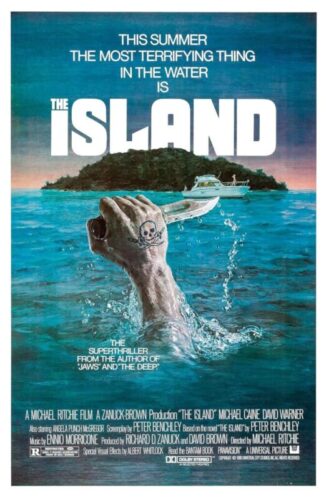
Boats have been disappearing in the Caribbean in the Bermuda Triangle area, the attackers killing all crew members except for children who they kidnap. British-born British-born American journalist Blair Maynard decides to investigate the mystery, and takes his 10 year old son with him from New York City to Florida with the promise of a vacation to Disney World. After charting a plane to the island of Navidad which crashes and explodes, the two are stranded for at least a day and go fishing. They’re attacked by a strange girl and man and forcibly brought to an uncharted island. On the island, Blair discovers that the inhabitants are a centuries-old colony of savage French pirates who have plans for both him and his son….
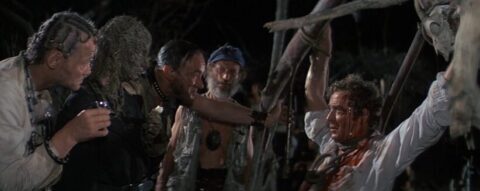
Michael Caine went through a phase of “paycheck movies” in the late ’70s and the early ’80s, and to be fair he’s happily admitted that he did them just the moment. When asked about Jaws 4: The Revenge, he responded: “I have never seen it, but by all accounts it is terrible. However, I have seen the house that it built for my mum, and it is terrific.”. And as far as I know he’s refused to even talk about The Island. The hugely uneven but at times weirdly inspired work might be the oddest out of these films, one of those which it’s hard to imagine actually came from a major studio. Clearly inspired by Lost Continent, A High Wind In Jamaica and even The Hills Have Eyes, I’m sure there are many who consider it to be the worst film Sir Michael ever did, but then again I’m also sure that there are a considerable amount of people who enjoy it for its absurdity. I can’t say that I didn’t enjoy the likes of The Swarm, Ashanti and even [I admit it] Blame It On Rio [while Dressed To Kill is legitimately very good], and upon revisiting The Island after about 35 years, I most certainly can’t say that I didn’t enjoy that too. I’d remembered it well, though then again I remember my whole viewing experience well. I’d recorded it off TV onto video [the way to do it back in the ’80s], but when my mum and I came to watch it the channel hadn’t been tuned in properly and the picture often jumped, got blurry and even went black and white – which might very well have been the best way to watch it. Its interesting if highly improbable premise, plus its central father and son relationship which goes to some dark places, get almost drowned by the frequent daft and odd scenes and elements. I mean right from the start we have a father who sets off on a potentially very dangerous expedition and quickly decides to takes his son along!
It was made because of novelist Peter Benchley. Jaws was massive, The Deep was pretty big, so a third adaptation of a Benchley book, especially if it had a screenplay written by the man himself, couldn’t fail, right? Even though in Bach’s book “Final Cut: Dreams And Disaster In The Making Of Heaven’s Gate” he mentions a meeting of studio executives where an attempted sell of the book, which most seemed to agree was “a piece of shit”, took place. Eventually Universal’s Richard Zanuck and David Brown paid Benchley $2.15 million for film rights and a first draft screenplay, as well as a guarantee of 10 percent of the gross, five percent of the soundtrack sales, and approval of the crew and locations – which at the time was the largest amount ever paid for film rights to any book. Benchley later claimed that he could have been able to retire if the film was more successful. Brown said the budget was $12 million plus 25% overhead but other reports put it over $20 million. Benchley’s final script followed the book fairly closely but toned down some of the more fantastical elements and removed a few details such as Maynard being given an enema. Steven Spielberg turned down the role of director because he was starting 1941. When Ritchie, who for some reason didn’t want any American actors in the film came on board, he allowed the cast members to improvise, resulting in a script that frequently changed even if the plot and scenes remained essentially the same. Shooting mostly took place on the islands of Antigua and Abaco, with some scenes also shot in the British West Indies and Florida at Miami and Fort Lauderdale. Many of the cast members belonged to Alcoholics Anonymous and would hold meetings on a beach on Antigua. The film wasn’t actually a flop, just a box office disappointment.
.The opening credits appear over the island, followed by an opening that’s straight out of a slasher movie which gives the impression that we’re watching a horror movie. We first join a deep sea fishing boat, and one of the guys on it catches a barracuda, though it’s had a chunk taken out of him from some other creature. They pass a nine-year old shipwreck, then dock near the island. Dinner is eaten, but one man spots a canoe with a large cloth on it. Somebody else climbs down onto the canoe and sees a hand sticking out; suddenly the cloth is cast aside and an axe is imbedded into his head, the killer then getting on to the boat and gorily slashing somebody else’s leg before obviously killing everybody else. Cut to New York City, and reporter Blair Maynard going into the office of his editor, whom he convinces to let him investigate the latest vessel missing in the Bermuda Triangle, claiming that 600 boats have vanished in that area in the last three years. In his own office, Maynard is surprised to find his former wife has left their 10-year-old son, Justin, with him for the weekend because she’s going away with her new boyfriend. Maynard is a real arse of a father; having let his son down in similar fashion before, he cajoles the reluctant boy into traveling to Florida, promising a trip to Disneyland which he has no intention of keeping, Jake accusing him of double-crossing him again. The two arrive in Miami where Justin manipulates his father into taking him to buy a handgun for him. They stop at a local gun shop where the rather gun-pushing owner demonstrates a Walther PPK semi-automatic pistol and takes it to the shop’s firing range. Both are good shots, though Maynard, having been in Korea, doesn’t share Justin’s enthusiasm, but is still allowed to buy it for him. Yes, for Justin.
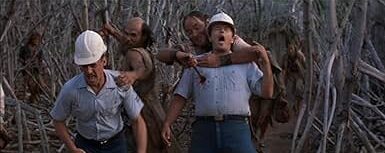
Meanwhile two sailing boats are also nearing the island and we get a nice and suspenseful buildup to terror – in fact all three of the major scenes in the first third of the film are really well handled by director Michael Ritchie who never did anything else like this – with a guy with his flipping hair on fire [we later see that this is something that he likes to do but here it makes for a startling image] appearing along with another man, though we don’t see these killings. The next day, Maynard and Justin visit the Miami docks and learn of the two additional missing boats, which set sail from the island of Navidad. A sailor theorises that drug smuggling is involved., but Maynard [“give me a chance Justin, it may be better than Disney World”] still hires a rickety cargo plane to fly to Navidad. However, its wheels don’t descend and they crash land, something the pilot seems to actually enjoy, and escape before it explodes [“I know I double crossed you, but now many dads give their kids an air crash”?]. Maynard visits a doctor who also rents boats and yes, it’s a rather long buildup, but this means that we get a real sense of the father / son dynamic. The next day they set off out to sea, but a girl lying in the water, one we actually saw on one off the boats earlier, turns out to be bait and the they’re taken to the island where Maynard is on trail for shooting a pirate in a farcical scene. These pirates have remained undetected since the establishment of their colony by French buccaneer L’Olonnais in 1671, a colony that raises any children they capture to ensure its survival, something especially important now since most of their women are ill or dead. Leader Jean-David Nau thinks that Maynard is descended from Robert Maynard, the naval officer who killed Blackbeard back in 1714, and therefore can’t be killed. He’s instead ordered to impregnate Nan, the widow of the man he killed, while Justin is renamed Tubar and forced to reject his father and embrace a way of life, a process that includes having his eyes kept open with twigs.
Eventually things largely resolve into Maynard trying to escape. The use of real historical figures in the script and the amount of time that we spend hanging out with these pirates does make us almost forget how ridiculous it is that this island has remained undiscovered all this time. They’re even given a strange sort of speech which in reality would more likely be based on French rather than English but never mind, this means we get to chuckle at things like sex being referred to as “thrusting”, with Maynard being told “you thrust, not talk”, kept shackled while Nan has her way with him, their first shag proceeded by her smearing mud on his chest, as you do, though we perhaps mercifully cut away from any actual “thrusting”. On the other hand we do see more blood spilt – not to mention a bizarre form of torture where a large jellyfish’s stingers are rubbed over the victim’s body – as any kind of vessel nearing the island is moat definitely going to get attacked, which leads me to mention two of the most bizarre things in this film. The pirates approaching and attacking vessels is accompanied by rousing music, not written by score composer Ennio Morricone but “which seems totally inappropriate for what we’re seeing on screen. However, it’s possible that, in using this music, Ritchie was mocking the romantic image of pirates that most movies have, his pirates being closer to the reality. But in a film like this it’s hard to tell. Then there’s the bit where a guy suddenly starts pretending to be Bruce Lee, with Nau being so impressed that he literally pauses a mass attack so he can watch him fight a few of his men. It seems out of place but I wouldn’t want the film to exist without if.
The part of the story that deals with Justin being “converted”, brainwashed to hate his dad and like shooting people, would probably be harrowing if it wasn’t rushed in places, plus the poor acting of young Jeffrey Frank. He’s just not capable of properly conveying his character’s changes and torment, though he does share some chemistry with Caine, who can’t really be complained about; he’s especially good in the first third when he’s flippantly trying to justify himself to his son. Maynard just isn’t a particularly decent guy for some time; the film details his transition into becoming a “real man”, a big part of that meaning killing loads of people. The actors playing the pirates are given full reign to have fun and go hammy except for David Warner who keeps it fairly cool in contrast. The girl who plays the “bait” I mentioned much earlier leaves a lasting impression despite having so little screen time, with a memorably unsettling look. Then there’s Frank Middlemass as Windsor, a professor who happily lives with and aids the pirates because he loves the way that the group is a throwback to a bygone age, uncorrupted by modern civilisation, though the inbred, disease ridden and hardly sane group hardly represent some Edenic paradise. Morricone opens with a calm theme that he uses a few times, but the score is dominated by his trademark suspense music style, atonal and grating. One piece using a male choir sounding a bit reminiscent of his spaghetti western music style wasn’t used. It’s definitely a lesser offering from the Maestro, but then he did write 12 other scores that year! In the course of writing this review I’ve come to the conclusion that, no, The Island isn’t Caine’s worst. Sometimes ridiculous, sometimes exciting, and sometimes really rather interesting, it deserves a bit more attention and reappraisal outside culty circles, even if it never quite finds its footing.





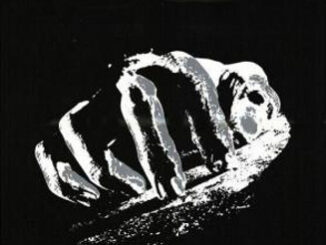
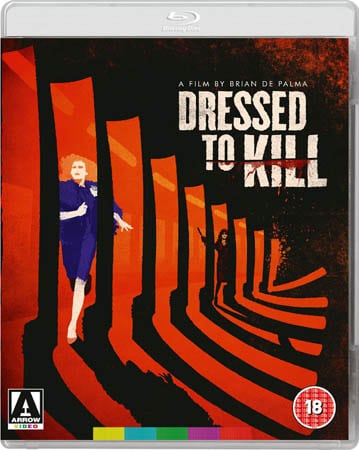
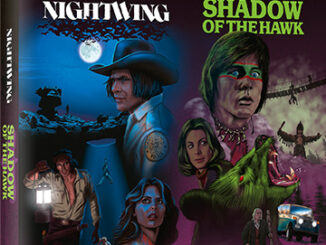
Be the first to comment